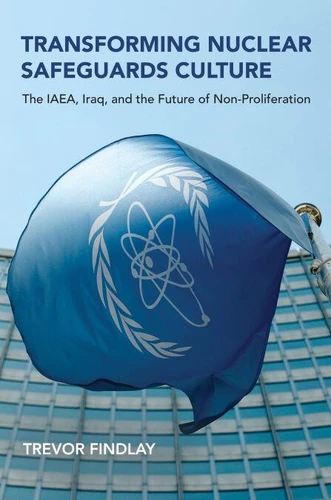Transforming Nuclear Safeguards Culture. The IAEA, Iraq, and the Future of Non - Proliferation
Par :Formats :
Disponible dans votre compte client Decitre ou Furet du Nord dès validation de votre commande. Le format ePub protégé est :
- Compatible avec une lecture sur My Vivlio (smartphone, tablette, ordinateur)
- Compatible avec une lecture sur liseuses Vivlio
- Pour les liseuses autres que Vivlio, vous devez utiliser le logiciel Adobe Digital Edition. Non compatible avec la lecture sur les liseuses Kindle, Remarkable et Sony
- Non compatible avec un achat hors France métropolitaine
 , qui est-ce ?
, qui est-ce ?Notre partenaire de plateforme de lecture numérique où vous retrouverez l'ensemble de vos ebooks gratuitement
Pour en savoir plus sur nos ebooks, consultez notre aide en ligne ici
- Nombre de pages384
- FormatePub
- ISBN978-0-262-36976-3
- EAN9780262369763
- Date de parution21/06/2022
- Protection num.Adobe DRM
- Taille664 Ko
- Infos supplémentairesepub
- ÉditeurThe MIT Press
Résumé
The role of organizational culture in international efforts to stop the spread of nuclear weapons. In Transforming Nuclear Safeguards Culture, Trevor Findlay investigates the role that organizational culture may play in preventing the spread of nuclear weapons, examining particularly how it affects the nuclear safeguards system of the International Atomic Energy Agency (IAEA), the paramount global organization in the non-proliferation field.
Findlay seeks to identify how organizational culture may have contributed to the IAEA's failure to detect Iraq's attempts to acquire illicit nuclear capabilities in the decade prior to the 1990 Gulf War and how the agency has sought to change safeguards culture since then. In doing so, he addresses an important piece of the nuclear nonproliferation puzzle: how to ensure that a robust international safeguards system, in perpetuity, might keep non-nuclear states from acquiring such weapons. Findlay, as one of the leading scholars on the IAEA, brings a valuable holistic perspective to his analysis of the agency's culture.
Transforming Nuclear Safeguards Culture will inspire debate about the role of organizational culture in a key international organization-a culture that its member states, leadership, and staff have often sought to ignore or downplay.
Findlay seeks to identify how organizational culture may have contributed to the IAEA's failure to detect Iraq's attempts to acquire illicit nuclear capabilities in the decade prior to the 1990 Gulf War and how the agency has sought to change safeguards culture since then. In doing so, he addresses an important piece of the nuclear nonproliferation puzzle: how to ensure that a robust international safeguards system, in perpetuity, might keep non-nuclear states from acquiring such weapons. Findlay, as one of the leading scholars on the IAEA, brings a valuable holistic perspective to his analysis of the agency's culture.
Transforming Nuclear Safeguards Culture will inspire debate about the role of organizational culture in a key international organization-a culture that its member states, leadership, and staff have often sought to ignore or downplay.
The role of organizational culture in international efforts to stop the spread of nuclear weapons. In Transforming Nuclear Safeguards Culture, Trevor Findlay investigates the role that organizational culture may play in preventing the spread of nuclear weapons, examining particularly how it affects the nuclear safeguards system of the International Atomic Energy Agency (IAEA), the paramount global organization in the non-proliferation field.
Findlay seeks to identify how organizational culture may have contributed to the IAEA's failure to detect Iraq's attempts to acquire illicit nuclear capabilities in the decade prior to the 1990 Gulf War and how the agency has sought to change safeguards culture since then. In doing so, he addresses an important piece of the nuclear nonproliferation puzzle: how to ensure that a robust international safeguards system, in perpetuity, might keep non-nuclear states from acquiring such weapons. Findlay, as one of the leading scholars on the IAEA, brings a valuable holistic perspective to his analysis of the agency's culture.
Transforming Nuclear Safeguards Culture will inspire debate about the role of organizational culture in a key international organization-a culture that its member states, leadership, and staff have often sought to ignore or downplay.
Findlay seeks to identify how organizational culture may have contributed to the IAEA's failure to detect Iraq's attempts to acquire illicit nuclear capabilities in the decade prior to the 1990 Gulf War and how the agency has sought to change safeguards culture since then. In doing so, he addresses an important piece of the nuclear nonproliferation puzzle: how to ensure that a robust international safeguards system, in perpetuity, might keep non-nuclear states from acquiring such weapons. Findlay, as one of the leading scholars on the IAEA, brings a valuable holistic perspective to his analysis of the agency's culture.
Transforming Nuclear Safeguards Culture will inspire debate about the role of organizational culture in a key international organization-a culture that its member states, leadership, and staff have often sought to ignore or downplay.



